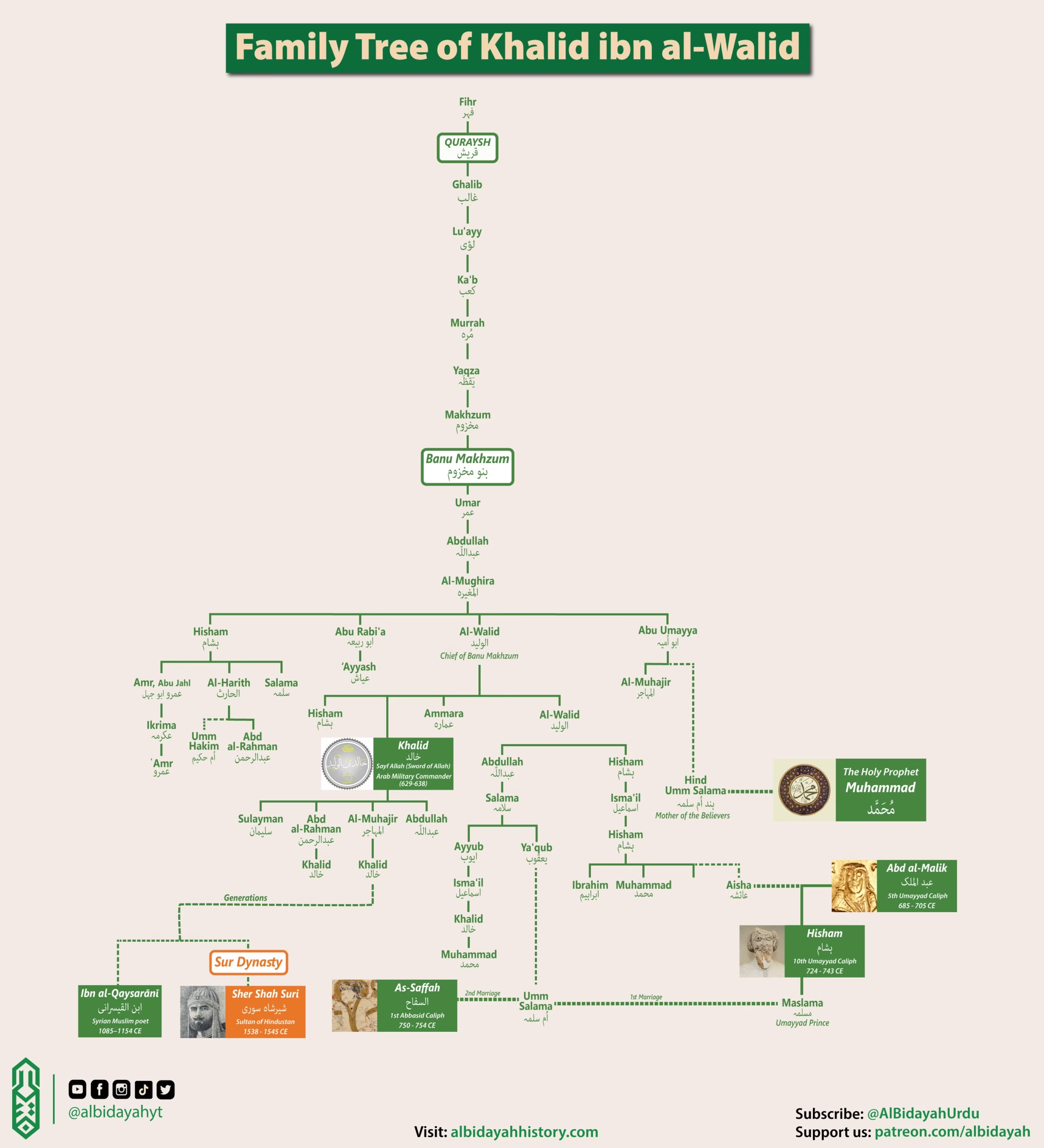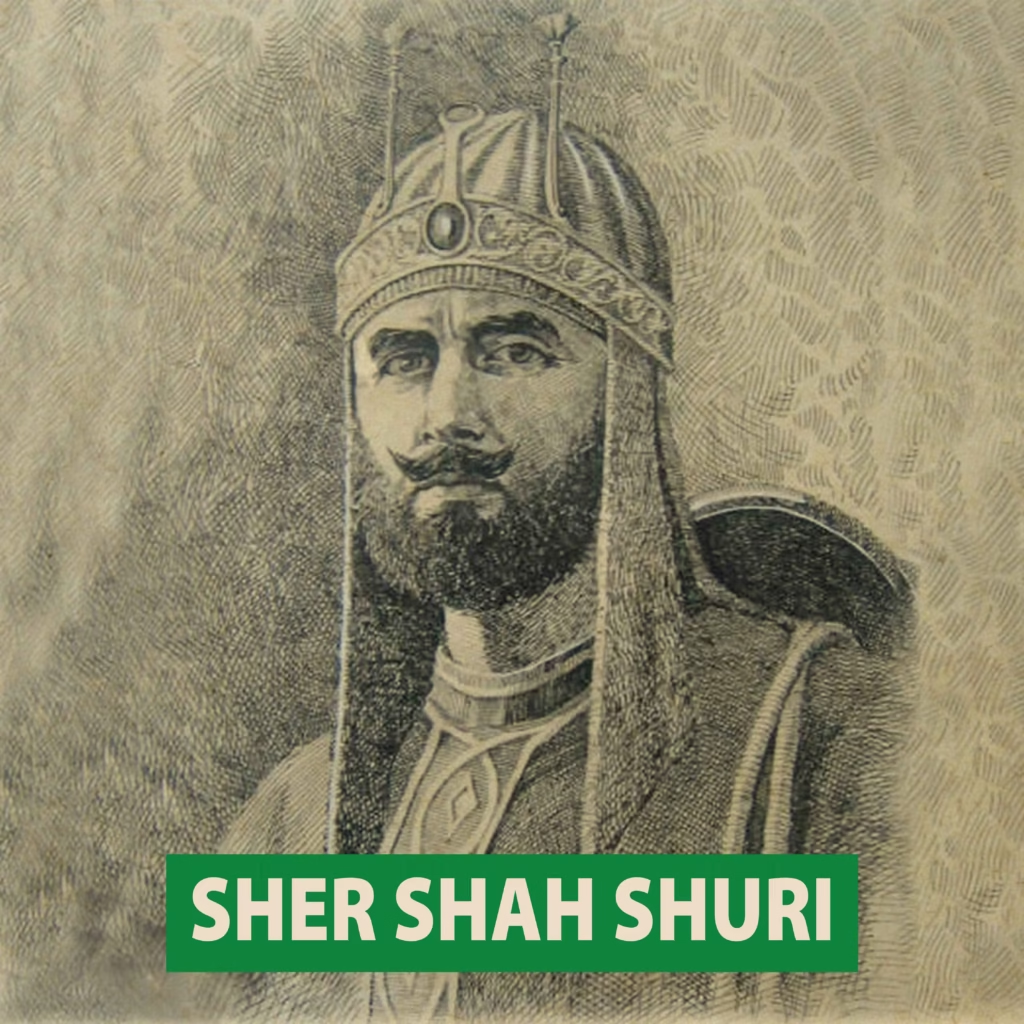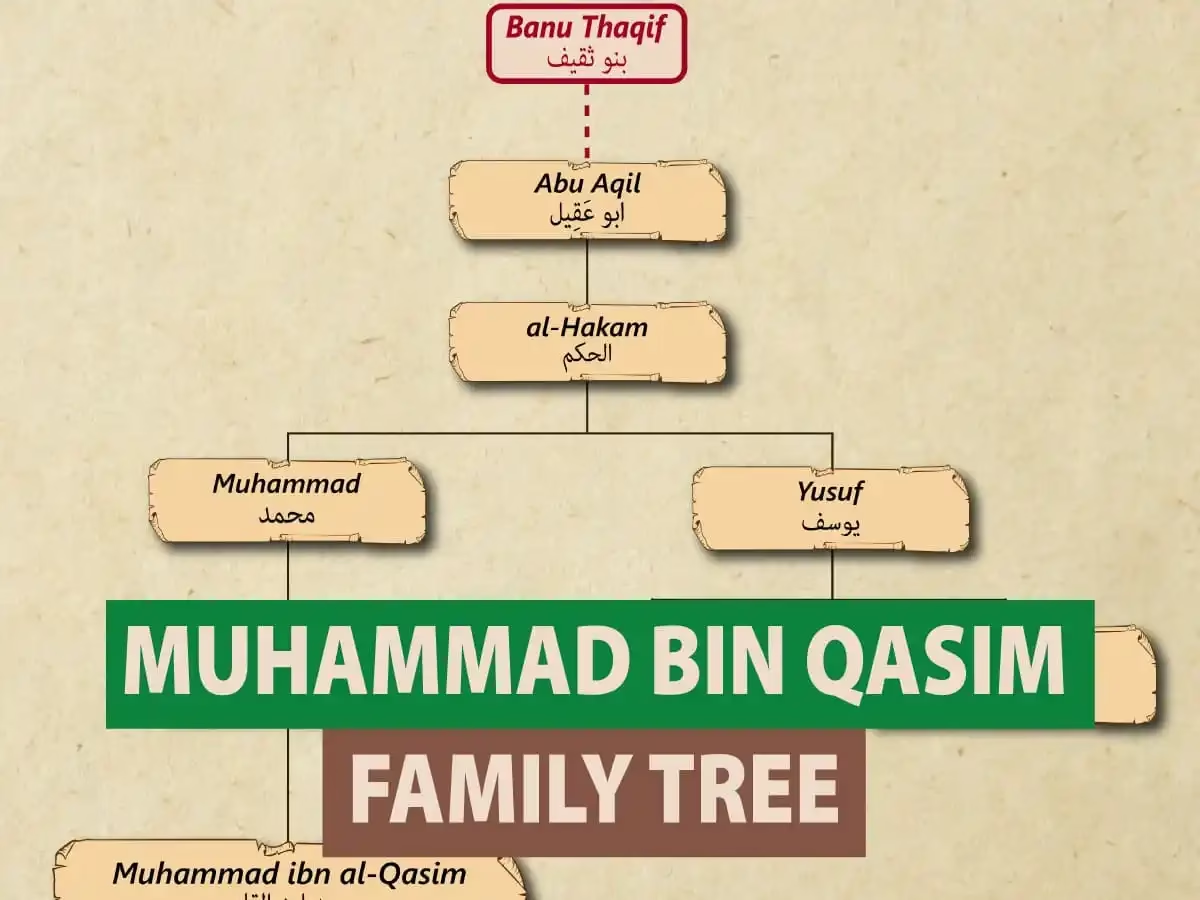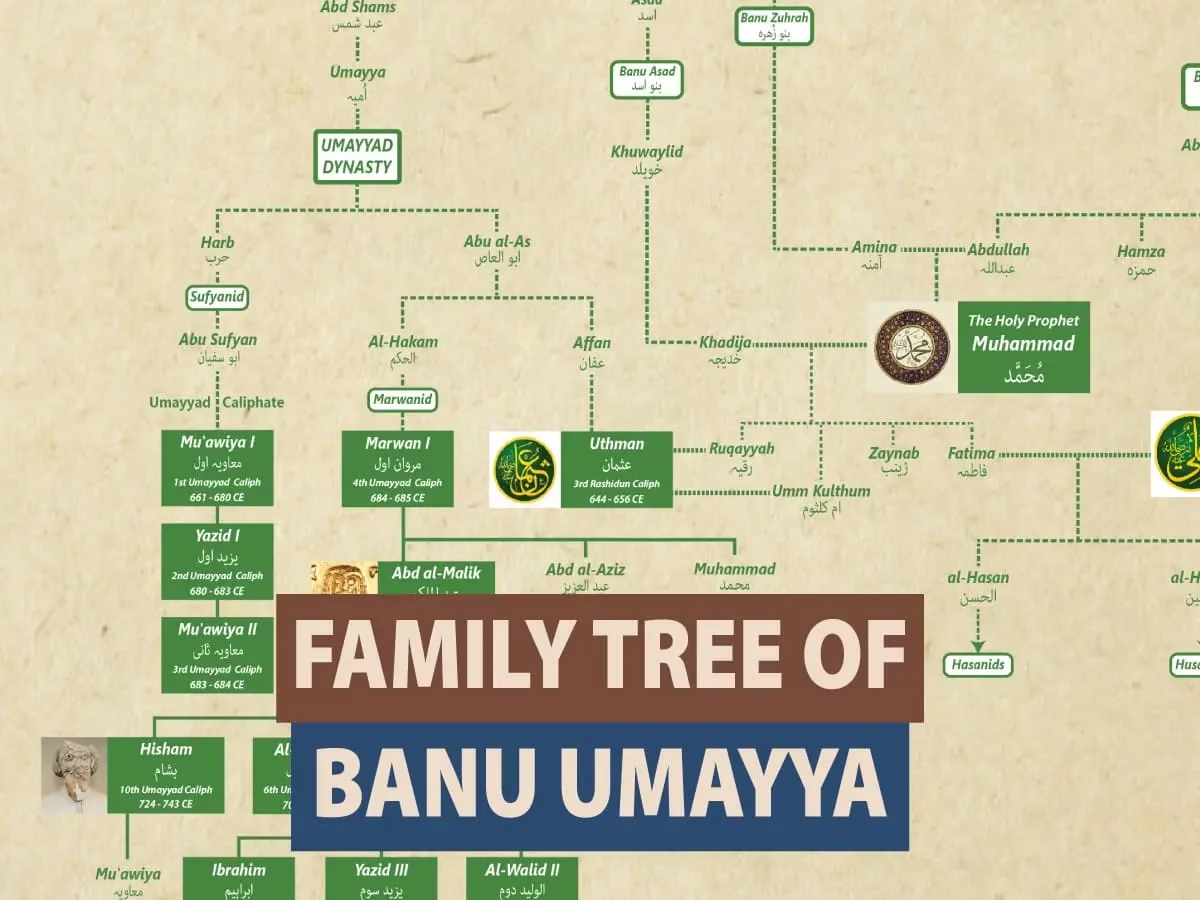The family tree of Khalid ibn al-Walid highlights his lineage and connections to key figures in Islamic history. Khalid descends from the noble Quraysh tribe, starting with Fihr and continuing through Ghalib, Lu’ay, Ka’b, Murrah, and Yaqza, leading to Makhzum, the founder of Banu Makhzum.
Khalid’s siblings include Hisham, Abu Rabī’a, and Abu Umayya, with ties to notable Islamic personalities like Hind bint Abi Umayya (Umm Salama), a wife of the Prophet Muhammad (peace be upon him).
This connects Khalid indirectly to the Prophet himself. Later generations trace connections to key historical figures like Abd al-Malik (Umayyad Caliph), Al-Saffah (founder of the Abbasid Caliphate), and Sher Shah Suri of the Sur Dynasty, demonstrating Khalid’s influential lineage and broad-reaching familial ties across Islamic history.

Makhzum (Founding Ancestor)
Makhzum, the progenitor of the clan, set the foundation for a powerful lineage. His descendants included warriors, leaders, and influential figures who played critical roles in Meccan society.
See Also: Prophet Muhammad (PBUH) Family Tree: Quraysh to Imam Mahdi
Al-Mughirah
Al-Mughirah was a key figure in the clan’s history and served as the chief of Banu Makhzum. He was revered for his leadership, wealth, and political influence, which helped the clan maintain its high status in Mecca.
Al-Walid ibn Al-Mughirah, Father of Khalid ibn al-Walid
Al-Walid, the son of Al-Mughirah, was among the wealthiest and most powerful men in Mecca. Known for his eloquence and pride, he was a fierce opponent of Islam during its early days. His opposition to Prophet Muhammad (peace be upon him) made him a symbol of the Qurayshi resistance. Despite this, Al-Walid’s legacy remains significant as a reflection of the struggles faced by early Muslims.
Khalid ibn al-Walid
Khalid ibn al-Walid, nicknamed “The Sword of Allah” (Saifullah), is the central figure of this family tree. Born into privilege, Khalid was trained in warfare from an early age, mastering horse riding, swordsmanship, and strategy.
Initially, Khalid opposed the Prophet Muhammad and played a key role in the Battle of Uhud, where his tactical brilliance led to a Quraysh victory. However, after the Treaty of Hudaybiyyah, Khalid embraced Islam, profoundly changing his life’s trajectory. His loyalty to Islam was unmatched, and his military genius became a cornerstone of the early Muslim conquests.
Some of Khalid’s most notable achievements include:
- The Battle of Mu’tah: Despite being vastly outnumbered, Khalid led the Muslim army to a tactical retreat, earning him the title “The Sword of Allah.“
- The Conquest of Arabia: Khalid played a key role in unifying the Arabian Peninsula under Islam.
- Campaigns in Iraq and Syria: His leadership during battles like Yarmouk and his strategies against the Byzantine and Sassanid Empires solidified the Muslim empire’s foundations.
Khalid’s leadership style combined courage, adaptability, and a deep understanding of his adversaries, making him one of history’s greatest generals.
See Also: Banu Umayya and Banu Hashim Family Tree
Khalid ibn al-Walid Siblings
Al-Walid ibn Al-Walid
Al-Walid ibn Al-Walid, the brother of Khalid ibn Al-Walid, was an early convert to Islam. His embrace of the new faith despite the hostility of his clan highlights the courage and conviction of the early Muslims. Al-Walid played a vital role in supporting the Muslim community and advocating for his brother Khalid to join Islam.
Sons of Khalid ibn al-Walid
Khalid had several sons who carried forward his legacy. Among them were:
1. Sulayman ibn Khalid
Khalid’s eldest son was named Sulayman, hence his kunya (‘paedonymic’) Abu Sulayman (‘father of Sulayman’).
2. Abd al-Rahman ibn Khalid
Abd al-Rahman ibn Khalid ibn al-Walid was the governor of Homs under third Rashidun Caliph Uthman (r. 644–656) and Mu’awiya I. Abd al-Rahman upheld his father’s tradition of military excellence, serving as governor and leading campaigns in Syria.
During Mu’awiya’s governorship of Syria, Abd al-Rahman commanded a number of campaigns against the Byzantine Empire and defended the Upper Mesopotamian frontier from the Iraq-based forces of Caliph Ali. He fought reputably against the latter at the Battle of Siffin in 657 and continued his governorship of Homs and campaigns against the Byzantines after Mu’awiya became caliph in 661. His battlefield reputation and descent from his father, the prominent general Khalid ibn al-Walid, made him particularly popular among the Arabs of Syria.
Mu’awiya ultimately perceived him as a potential rival of his own son Yazid, who he was grooming as his successor, which led the caliph to allegedly order Abd al-Rahman’s poisoning in 666.
3. Muhajir ibn Khalid
Unlike his paternal brother Abd al-Rahman, Muhajir supported Caliph Ali (r. 656–661) in the First Fitna and died fighting against the army of Ali’s principal enemy, the governor of Syria and future founder of the Umayyad Caliphate Mu’awiya ibn Abi Sufyan, at the Battle of Siffin. After Abd al-Rahman was alleged to have been poisoned to death on Mu’awiya’s orders in 666/67, Muhajir’s son Khalid from Mecca killed his uncle’s alleged poisoner Ibn Uthal in Syria, was arrested and released after paying blood money.
Khalid ibn Muhajir was also a poet and sided with Abd Allah ibn al-Zubayr, a rival claimant to the caliphate, against the Umayyads during the Second Fitna.
Khalid ibn al-Walid Cousins
Abu Jahl (Amr ibn Hisham)
Abu Jahl, Khalid’s cousin, was a staunch opponent of Islam and a key leader of the Quraysh in their resistance to the Prophet Muhammad. Known as the “Pharaoh of this Ummah,” Abu Jahl’s opposition culminated in his death at the Battle of Badr. Despite his resistance to Islam, his legacy impacted the dynamics of the Banu Makhzum and Khalid’s early life.
Abu Jahl’s sons, Ikrimah ibn Abi Jahl and others, later embraced Islam, showcasing the eventual reconciliation between early opponents and the nascent Muslim community.
Connections with Umm Salama: The Mother of the Believers
Umm Salama (Hind bint Abi Umayya or Hind al-Makhzūmiyya), a descendant of the Banu Makhzum, holds a revered position in Islamic history as one of the wives of Prophet Muhammad (peace be upon him) and a “Mother of the Believers” (Umm al-Muʼminin). Known for her intelligence, wisdom, and devotion, Umm Salama contributed to the early Islamic community with her guidance and narration of hadith. Her life reflects the profound impact of women in the development of Islam.
Generations of Khalid ibn al-Walid
The Sur Dynasty: Khalid’s lineage extended to the rulers of the Sur Dynasty, such as Sher Shah Suri, who established a short-lived but impactful empire in India. Sher Shah is remembered for his administrative reforms and the construction of the Grand Trunk Road, a vital trade route.

Ibn al-Qaysarani: Another descendant who made significant contributions in later Islamic history.
Legacy of Khalid ibn al-Walid
The family tree underscores the legacy of Khalid ibn al-Walid as a figure who bridged pre-Islamic and Islamic eras. His life serves as a testament to the transformative power of faith and the enduring impact of leadership. Khalid’s strategic brilliance and unwavering dedication to Islam ensure that his name remains immortalized in history.
See Also: Banu Abbas Family Tree (Abbasid Dynasty)



